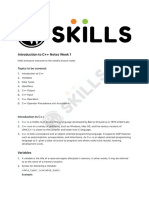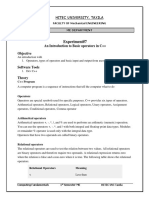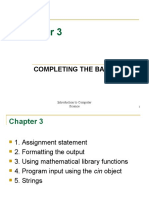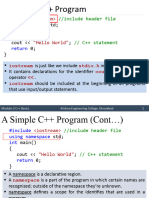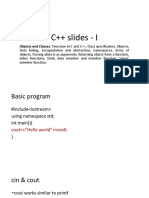0% found this document useful (0 votes)
53 views17 pagesC++ Programming: Academic Year 2018-2019 Lecturer Zanco A. Taha (MSC.)
The document outlines a C++ programming course covering variables and constants, strings and operators, and input and output. It introduces variable declaration and initialization, arithmetic operators, relational and logical operators, and conditional statements. It also covers strings, constants, increment/decrement operators, and basic input/output using cout and cin. The course will help students learn fundamental C++ concepts needed for programming.
Uploaded by
Rahel SabrCopyright
© © All Rights Reserved
We take content rights seriously. If you suspect this is your content, claim it here.
Available Formats
Download as PDF, TXT or read online on Scribd
0% found this document useful (0 votes)
53 views17 pagesC++ Programming: Academic Year 2018-2019 Lecturer Zanco A. Taha (MSC.)
The document outlines a C++ programming course covering variables and constants, strings and operators, and input and output. It introduces variable declaration and initialization, arithmetic operators, relational and logical operators, and conditional statements. It also covers strings, constants, increment/decrement operators, and basic input/output using cout and cin. The course will help students learn fundamental C++ concepts needed for programming.
Uploaded by
Rahel SabrCopyright
© © All Rights Reserved
We take content rights seriously. If you suspect this is your content, claim it here.
Available Formats
Download as PDF, TXT or read online on Scribd
/ 17





























